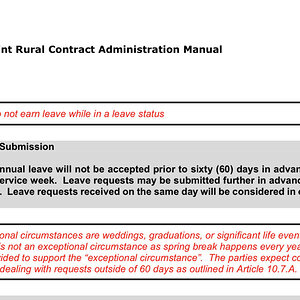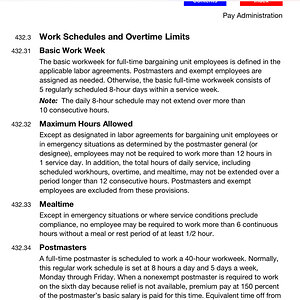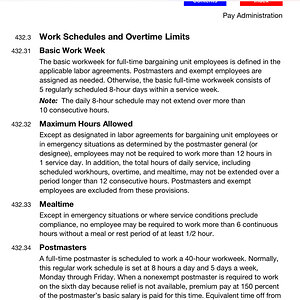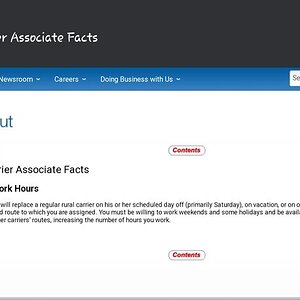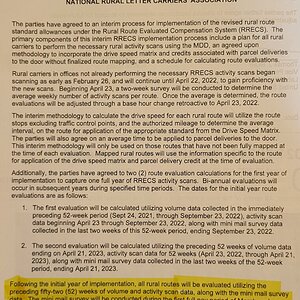Havegonenow et al -- "Will RRECS be fair?" ( excellent piece by the way )
-- It will depend on the scale one uses, such as:
Poor / Fair / Good / Excellent / Outstanding / Stellar
-- Cherry-picking time:
"How can a struggling USPS continue to pay some rural carriers 2-3 hours a day for work they are not doing."
- Because manglement is not adhering to the PO-603's Section 151.2 Performance Appraisal. Short version: managers should consider "corrective action" if a carrier is consistently three hours over or under a route's weekly evaluation.
- Actually the USPS has been doing it for years and years and years. At contract and arbitration time, the USPS has no problem bringing up / pointing out the hours paid for but not worked ( aka the dreaded "bump" when carriers finish under a route's evaluation ).
- And the USPS makes known it is "cash strapped" or in "dire financial" situation to the Arbitrator. Arbitrator Wells' comment in his 2002 award:
- "Based on the Postal Service's dire financial condition, the practice of providing the dollar amount equivalent will not be applied to the 1.2% and 1.8% general wage increase in November 2000 and November 2001, respectively."
- "As long as the financial condition of the USPS places it at risk, similar measures [ Arbitrator Goldberg's lump sum payment in lieu of general wage increase ] should be employed in those years in order to allow the Postal Service to regain its footing and once more become financially viable institution.
-- What constitutes a "financially viable institution"? Since the 2002 Arbitration, the USPS has purchased hundred of thousands of scanners. Put out bids for the NGDV which is estimated to be around $ 6 BILLION. There must be some "loose change" lying around somewhere.
- On the other hand, the NRLCA NEVER mentions the "free work hours" the USPS gets when carrier work over a route's evaluation.
-- Moving on to Arbitrator Clarke.
- "The evidence presented shows overwhelmingly that the average quantum of time paid for but not worked grew dramatically during the term of the 2006 NRLCA-USPS Agreement. In deed, the UNREBUTTED evidence ( that would be the place where the NRLCA was suppose to say something ) shows that the average amount of time paid for but not worked increased from about 160 minutes per week in 2006 to over 320 minutes per week in 2010." ( anyone remember the USPS lamenting how first class mail pieces were decreasing? )
- "The cost involved in the Mileage standard adjustment sought ( over one billion dollars ) is so great that this Board of Arbitration could not grant it without doing serious harm to the USPS and eventually to the Rural Letter Carriers." ( someone seem to be watching out for the USPS )
"Many can't even think of taking a high option because of their work hour problems. "
-- Partially thank Arbitrator Clarke for increasing the number of years as a regular to 10 before being able to take the High Option.
"They don't consider that their routes may be part of the problem."
- More to the point, it is the lack of accurate mail counts.
- How many routes had a mail count, then Amazon showed up a few weeks later. And have not been counted since?
- Even in Pre-Amazon days, mail count would begin and UPS and FedEx trucks seen more out on routes than dropping off parcels at the post office. BB&B, Money Pages, Home & Decor, Mint Magazines, Val-Pak to mention a few mailings just "happen" to show up a week before or after count. To the NRLCA national officers that was just "anecdotal" evidence of things happening in "just a few places", no big deal. Of course their pay was not based upon a count.
- Ever read MOU #1? Apparently the national officers just skim over it. "It is the understanding of the parties that a national mail count may be initiated where rural delivery has been impacted on a national level. Examples of such change would be a reduction of delivery days, a substantial change in mail volume, etc." ( apparently the avalanche of Amazon parcels has not been felt on a nationwide basis -- JMHO )
- Two "killer" items in MOU #1:
a. the word "may" ( might as well have included "or may not" )
b. at least the MOU could have mentioned just who could initiate a national mail count -- as it certainly has not been the USPS.
- Likewise Article 9.2.C.11. Special Counts. a. Special counts are conducted under the following two ( 2 ) circumstances:
( 1 ) When circumstances have negated the validity of the latest count and evaluation.
( 2 ) Whenever a 120 minute ( 2 hours ) or more salary adjustment is made on a route, whether due to a substantial service change or a route adjustment.
-- The NRLCA national officers requesting to go hourly?
- Apparently if other national officers are of the same mindset as X-president Dwyer, not likely to happen, as she mentioned she has never considered anything else but evaluation.
-- Anyone have a special feeling about the date 20 MAY 2015?
Okay, I'll get off of the soap box now.
Have a safe week and stay away from any virus that may be out there.


